Were you annoyed by the way my last post, after all the buildup to the duel between Peter and Miraz, ended just as it was beginning? Probably not because I’m not that gripping of a writer. But if you were, you know how I feel when the movie cuts from the beginning of the fight to Susan and Lucy galloping through the forest. (Well, technically, the horse is the one galloping.) Suddenly, some Telmarine soldiers are pursuing them. Once there’s a good distance between the pursuers and the pursued, Susan dismounts and tells Lucy to go on without her. The soundtrack plays a great melancholy variation of the Pevensies’ heroic theme as Lucy just before she’s ridden out of sight, stops and turns back for what might be a last look at her sister.
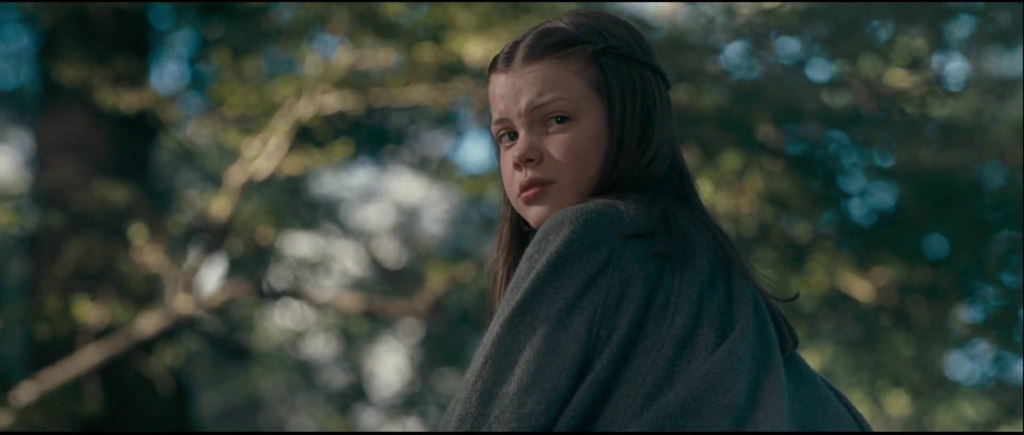
As soon as Lucy’s gone, the soldiers ride into view but by this time, Susan has drawn her bow. She takes them down one by one (she’s really good at nocking those arrows quickly) until a horse coming from an unexpected direction knocks her down and her weapon out of her hand. Things look bad when all of a sudden, Caspian, who apparently has been stalking Susan, rides onto the scene and slays her attacker. “Are you sure you don’t need that horn?” he asks playfully, holding out his hand. Susan beams and accepts it.
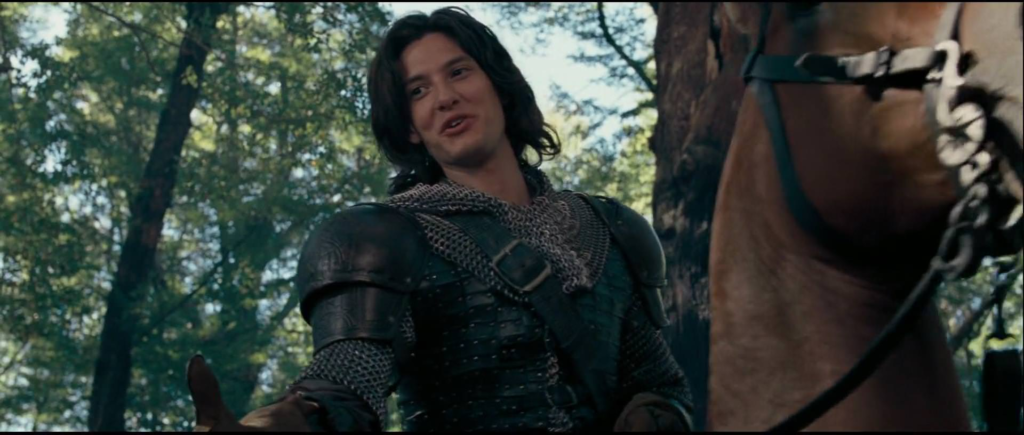
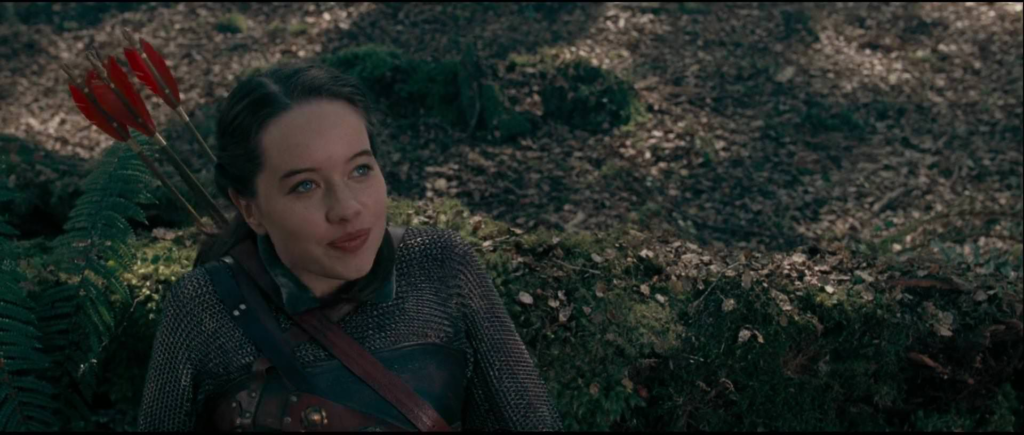
So, the whole reason the movie had Susan accompany Lucy was that they wanted a scene of Caspian rescuing her and (almost literally) sweeping her off her feet? Argh! I know some readers are probably annoyed that I keep carping about that added romance, but the film was asking for it there. And the funny thing is this adaptation tries so hard to make Susan’s character more feminist friendly. You know what many feminists would like to see? The leading lady not needing to be rescued by her male love interest!
All right. Back to Peter and Miraz. Although I wrote that I was annoyed that the movie cut away from their duel just as it was beginning, I don’t have much to say about it. That’s better than having bad things to say about it. Still, considering this is the beginning of the movie’s big climax, I wish I had really good things to say about it. Probably, the problem is that Peter has been such an unpleasant character for so much of the film prior to this so I’m not as invested in him as might be wished. I’m not horribly uninvested though. After all, the Narnians don’t deserve to lose to the Telmarines just because their champion is hard to like. And Peter has had some sympathetic aspects to his character, such as his guilt over not being there when Narnia was conquered. Still, this scene would, I believe, be more gripping if we really liked him.

As in the book, Peter and Miraz seem pretty well matched at first with Peter even being the one to draw the first blood. But before long, it starts to look bad for the Narnians. At one point, when Peter falls on his back, Miraz stamps on his hand[1]Actually, it looks like he just steps on his shield but the way Peter roars, it makes more sense for him to have stepped on his hand so that’s what I imagine., an act more brutal than anything I can think in the book’s description of the duel.[2]There is some violence in the battle after the duel in the book that I’d describe as brutal. The Bulgy Bear gasps and puts his paw in his mouth, which would work better if they had kept that deleted scene that I discussed in the last post but is still funny as it is.
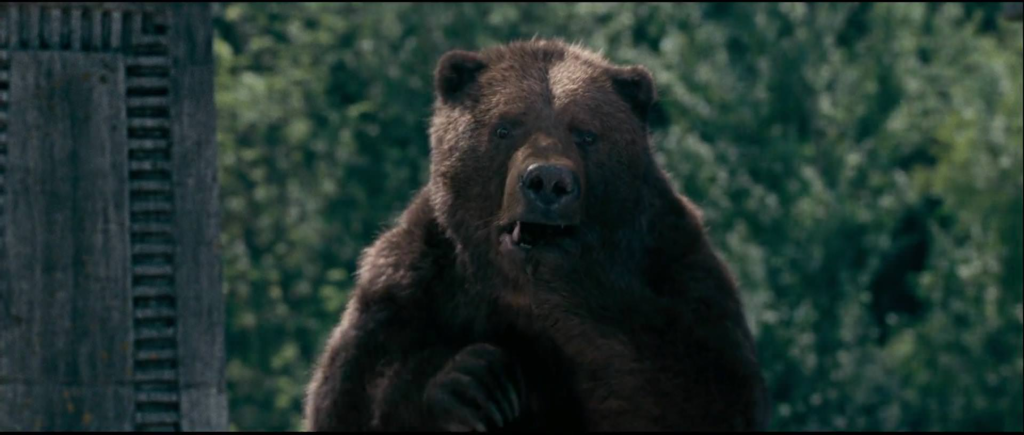
Peter recovers quickly and Miraz is soon the one knocked off his feet. Not for long though. As Miraz rises, Peter sees Caspian and Susan returning to the How.
Miraz (panting): Does his highness need a respite?
Peter: Five minutes?
Miraz: Three!
I’m glad they kept this respite from the book when it could easily have been cut for fear of breaking up the tension. It’s a good emotional beat in both versions. The movie has given a reason for it besides Peter’s shoulder being dislocated. He now wants to ask about Lucy. The other reason is still clearly a thing though.[3]In the book, by the way, Peter describes his shoulder as sprained, not dislocated.
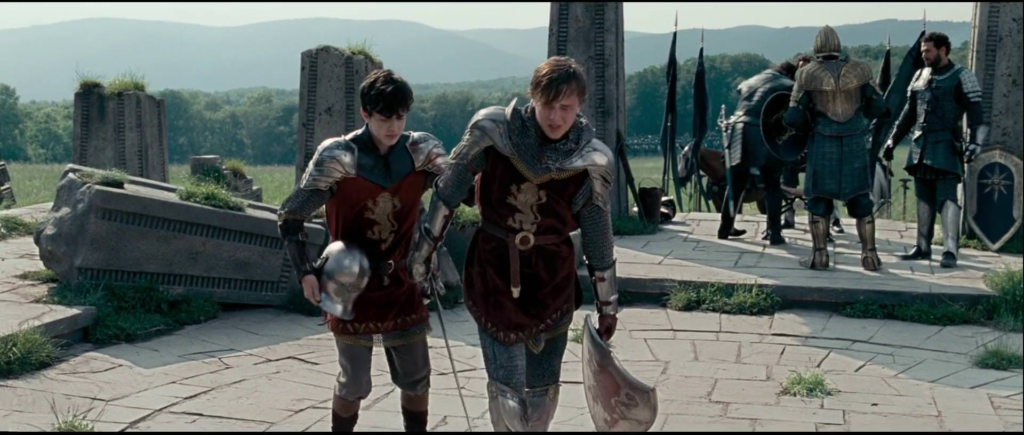
Susan tells Peter that Lucy “got through. With a little help.” She indicates Caspian as she says the last bit. “Thanks,” Peter says to Caspian. “Well, you were busy,” he replies. You know, maybe I was too hard on the movie when I said it only created that scene of Caspian rescuing Susan to add pointless romance. Maybe the idea was to create a moment of Peter thanking Caspian to make up for the earlier unpleasantness between them. It doesn’t really register that way onscreen though. William Moseley’s Peter doesn’t look like he’s reevaluating Caspian. He just looks exhausted as well he might. Anyway, Peter warns Susan that she’d better get to higher ground. “I don’t expect the Telmarines will keep their word.” She gives him a farewell hug, which unfortunately hurts his shoulder, and tells him to be careful. Like I said, this would be more effective if we really liked Peter but as it is, it’s certainly not ineffective.
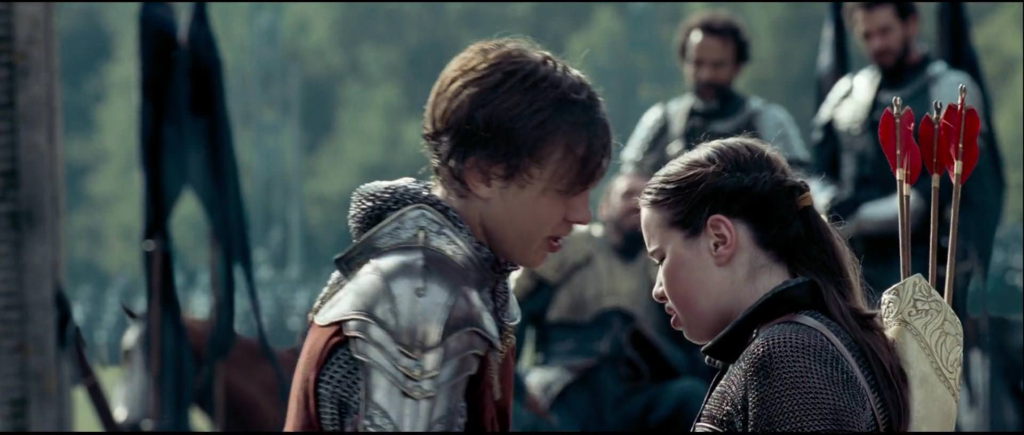
Edmund notices the Narnians looking worried and urges Peter to “keep smiling.” Peter turns to his army, puts on a forced smile for their benefit and salutes them with his sword. They cheer, either because they appreciate the effort or because they’re genuinely convinced by his bravado.
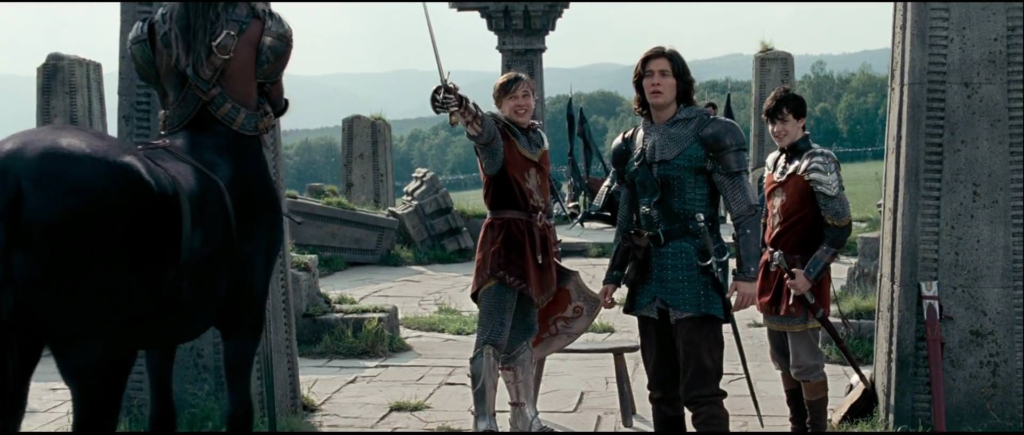
The movie also shows us the respite from Miraz’s perspective, something the book doesn’t. First, he berates Glozelle for letting Peter get so close. Then while Glozelle is tending to his wound, he asks his marshals how Peter looks to them. “Young,” Sopespian says tauntingly. “But His Majesty is doing extremely well,” says Glozelle, “for his age.” As he says that, he tightens Miraz’s bandage and makes him scream, no doubt on purpose.
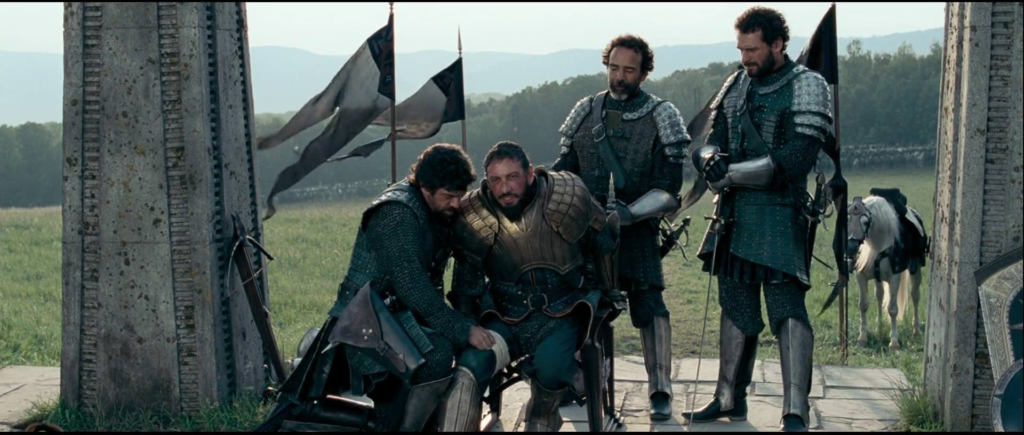
Meanwhile, Edmund tends to Peter’s shoulder and Peter asks him, “What do you think happens back home if we die here?” That question isn’t asked in the book, Prince Caspian, but it is asked by the characters in the last and darkest Narnia story, The Last Battle. Since no movie adaptation of The Last Battle has been made, I’m glad the moment was worked into this film. In spite of the ominousness of its inclusion, the respite ends on a more humorous note than it does in the book. There Peter told Edmund to give his love to everyone at home if he died and to “say something specially nice to Trumpkin,” and Edmund was too upset to speak. In the movie, Peter starts to say, “You know, you’ve always been there and I never really-” He’s cut off by his own cries of pain as Edmund finishes adjusting his shoulder. “Just save it for later,” Edmund says.
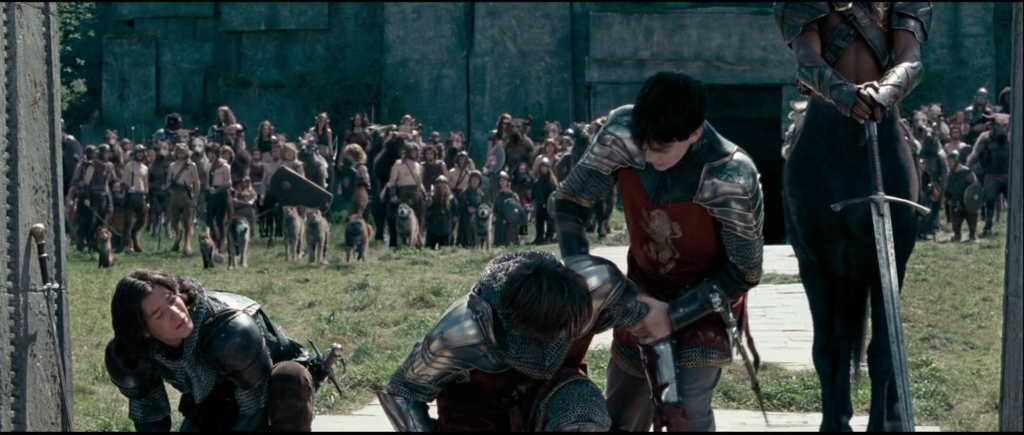
Susan and Trumpkin exchange worried looks. Glozelle offers Miraz his helmet back and he refuses it out of bravado. (Peter lost his helmet earlier since the movie wants us to be able to see his face.) Then it’s back into the fray. At first, an increasingly desperate Miraz looks like he might overpower Peter. But if that happens, Peter is going to make him work for it. At one point, Miraz actually loses his sword and can only hold up his shield against the blows Peter rains down. Then he punches him, which I’m pretty sure is against the rules, and then he sort of tries to crush Peter with his shield and then Peter twists it away from him. I’m afraid this part of the scene comes across as rather silly.
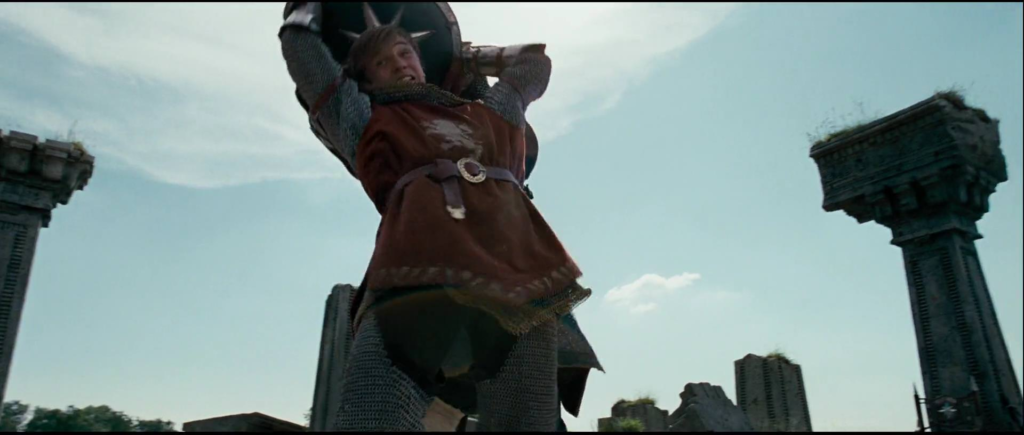
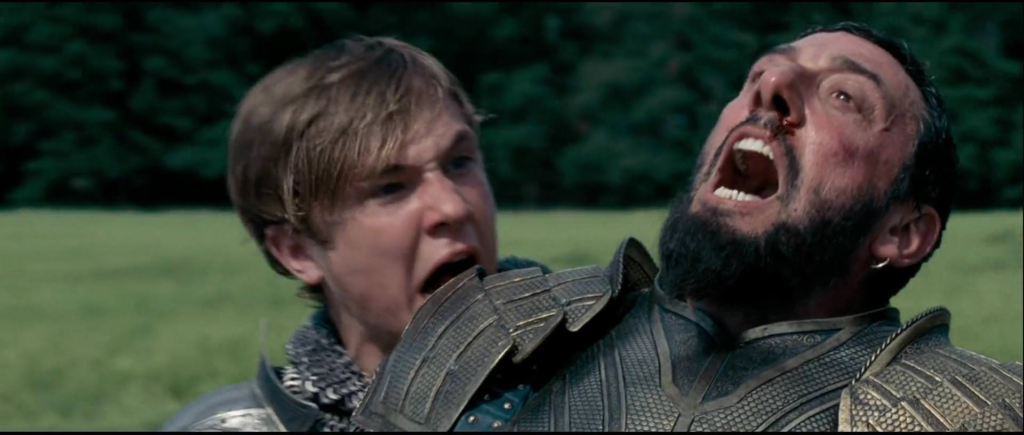
Eventually, Miraz gets his sword back but Peter wounds him in his already sore knee and Miraz is on his knees, begging for another respite. “Now’s not the time for chivalry, Peter!” Edmund calls. This is actually inspired by an inner monologue of Edmund’s in the book when Miraz trips and Peter pauses for him to rise.
“Oh bother, bother, bother,” said Edmund to himself. “Need he be as gentlemanly as all that? I suppose he must. Comes of being a Knight and a High King. I suppose it is what Aslan would like. But that brute will be up again in a minute and then —”
I feel like the book’s version is funnier, but I can understand why it would need to be shortened. Then something happens that doesn’t in the book. As Peter turns away, Miraz, snarling, leaps to feet and tries to swipe Peter’s head off from behind. Peter turns just in time and stabs his treacherous opponent under the arm. Miraz is on his knees again and this time, it looks like Peter really will take the opportunity to finish him off. But no.
Miraz: What’s the matter, boy? Too cowardly to take a life?
Peter: It’s not mine to take.
Peter offers his sword to Caspian who steps up to the metaphorical plate. Is this normal in these war-determining duels?[4]For what it’s worth, in C. S. Lewis’s Till We Have Faces, which depicts a similar dramatic situation, the antagonistic king says he will disarm the main character, Queen Orual, and then … Continue reading Caspian raises the sword. “Perhaps I was wrong,” says Miraz, “Maybe you do have the makings of a Telmarine king after all.”
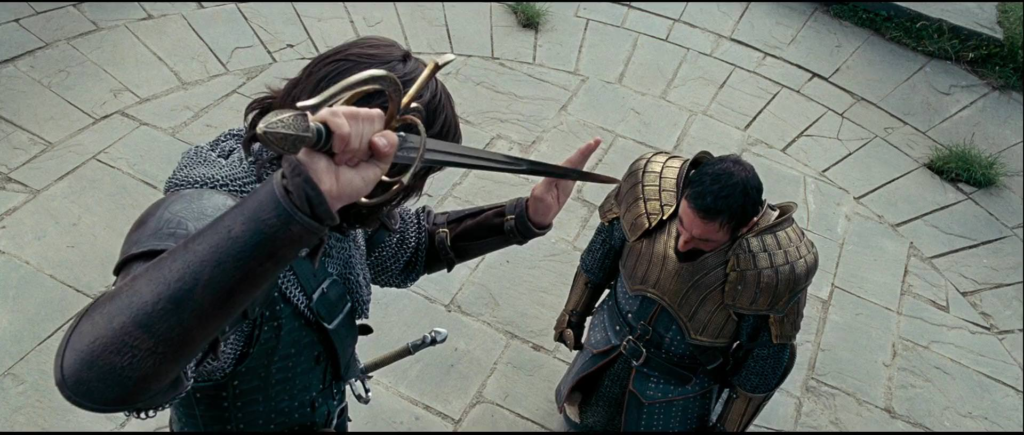
Caspian roars and brings down the sword but instead of stabbing Miraz, he just stabs a conveniently placed patch of grass.
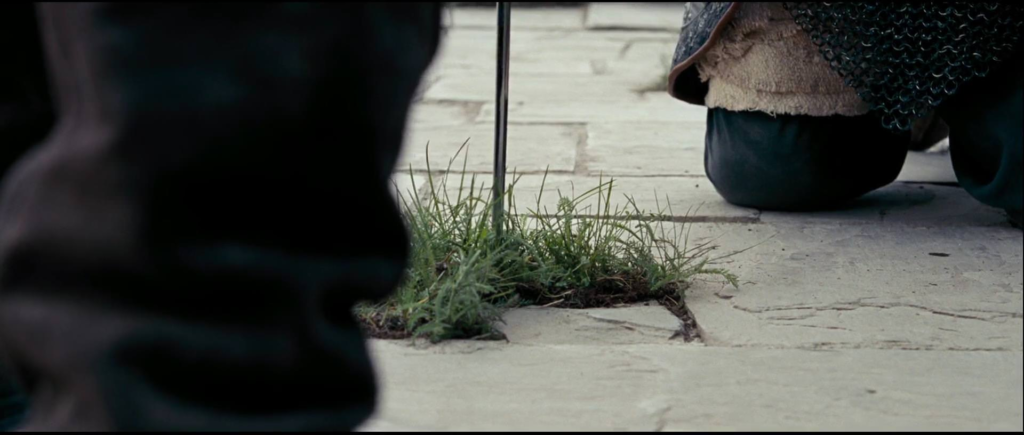
“Not one like you,” he says, “Keep your life but I am giving the Narnians back their kingdom.” Caspian turns and heads back to the How. The Narnians cheer him. Sopespian, who doesn’t want the Narnians to take over but very much wants Miraz dead, is disappointed. Glozelle, on the other hand, looks impressed.
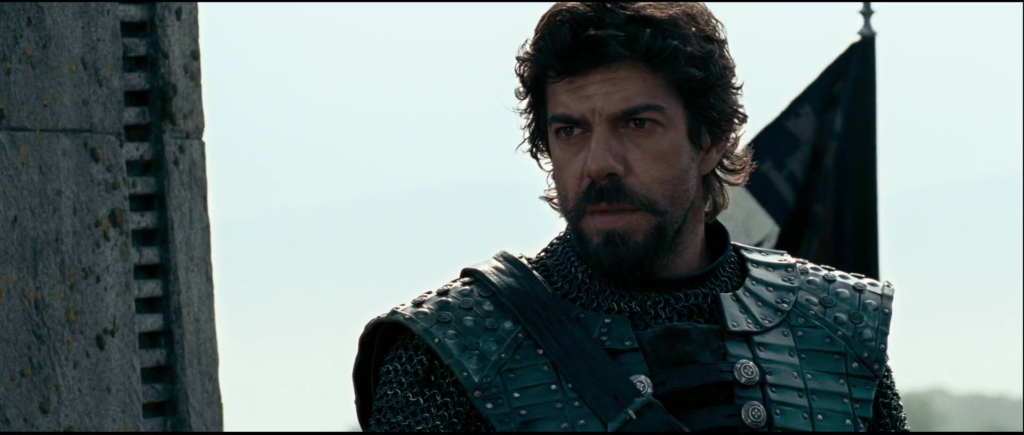
Susan also looks impressed, and can I carp about the romance thing one more time? Part of what annoys me about it is that in the book, Susan’s storyline was all about her relationships with Aslan and Lucy. Those are still definitely there in the movie but most of the emphasis falls on her relationship with Caspian. Even the scene of her protecting Lucy as they go to find Aslan ultimately ended up being about Caspian saving her.
Still, I will say this for the movie. While it does add romance to the book’s story, at least it doesn’t add a love triangle. The love triangle is one of my least favorite dramatic devices. Not that it can’t be done well. One of my favorite plays, Edmond Rostand’s Cyrano de Bergerac, is all about a love triangle. But too often they just feel like easy ways to get the story’s fandom warring against itself. Even in my beloved Les Misérables, the love triangle is the most dramatically flawed and potentially annoying part.[5]I am referring to the musical version, not the literary one in which Eponine is a villain albeit an interesting one and very few readers root for her to end up with Marius.
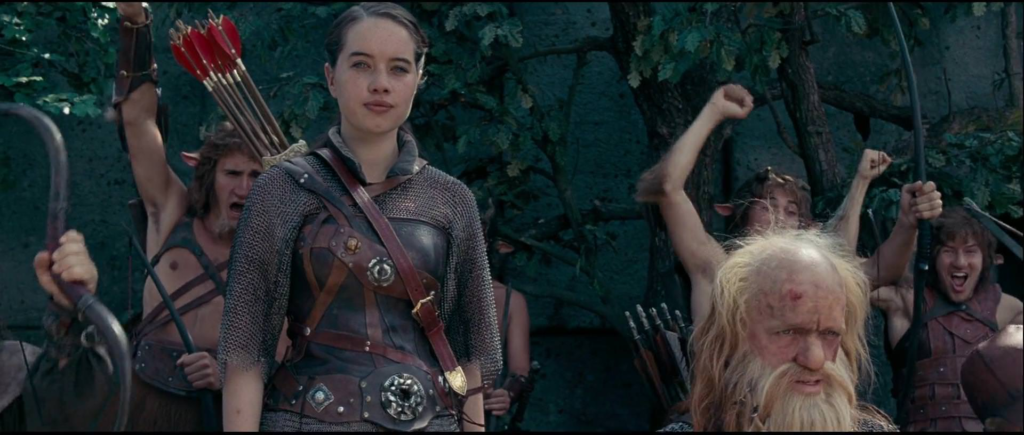
Let’s talk about the whole Caspian-sparing-Miraz thing. I’m glad that the adaptation didn’t make the duel between Caspian and Miraz even though that would be the conventional thing to do. I believe it’s thematically important that it be a showdown between Peter, the champion of Old Narnia, and Miraz, the Telmarine who’s been most dismissive of Old Narnia. At the same time…I can understand feeling that it should have been between Caspian and Miraz. Despite having his name in the title, Caspian has practically nothing to do in the last third of the book. The movie is arguably trying to fix a real dramatic problem with the source material. But the compromise they found strikes me as awkward with Peter doing all the work and then suddenly saying Caspian should kill Miraz. And then there’s what come next.
In the book, nobody has a problem with Caspian wanting to avenge his murdered father. Peter just objects because he’s been wounded by the werewolf and his uncle wouldn’t take a challenge from him seriously anyway. In two other Narnia books, The Voyage of the Dawn Treader and The Silver Chair, wanting to avenge someone’s death is portrayed sympathetically. C. S. Lewis was coming from a more medieval morality whereas the movie takes a more modern view. I don’t necessarily think that that medieval view was right and the modern one wrong. (Not on this subject anyway.) But I do feel that the whole if-you-kill-him-you’ll-be-just-like-him thing comes across as cliche, especially that bit where Caspian looks like he’s going to kill Miraz but then stabs something else. I admit I’m not enough of a cinephile to give examples of this from other films, but it really smells rote and boring to me, making this sadly the first example in a Narnia movie of an arc that I simply do not like as opposed to one that I just think could have been executed better. I really wish the movie could have focused instead on Caspian’s dissatisfaction with the world into which he was born and his longing for the Narnia of his bedtime stories. That was arguably the heart of the book. And, yeah, I know the book isn’t the most beloved entry in The Chronicles of Narnia but that was in spite of that theme, not because of it.
Back to the movie. Sopespian helps the humiliated Miraz to his feet. “I’ll deal with you when this is over,” Miraz snarls, desperately trying to regain his dignity. “It is over,” says Sopespian with a grin and stabs Miraz to death with a Narnian arrow, Susan’s arrow that Miraz showed him earlier, I believe. It’s a great creepy moment.
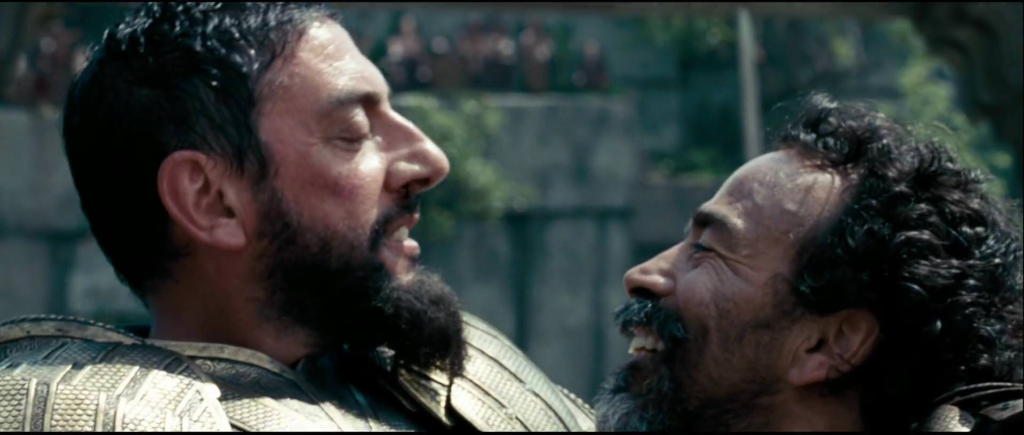
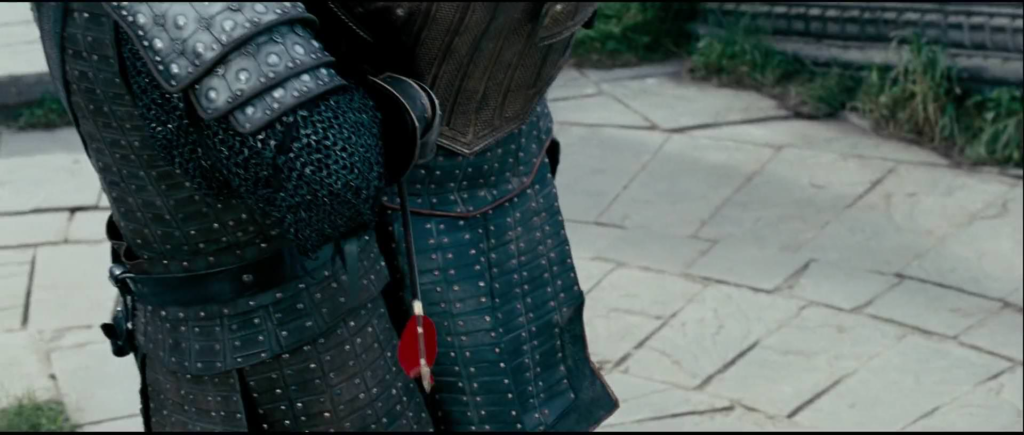
Then Sopespian points at Aslan’s How and yells “Treachery! They shot him! They murdered our king!” Peter, seeing that the Telmarines are now about to attack commands the Narnians to be ready.
Now I enjoy the book’s surprise of Glozelle and Sopespian being the ones to kill Miraz when convention would dictate that Peter or Caspian would do so-or maybe Aslan given the precedent set by The Lion, the Witch and the Wardrobe. And I’m glad the movie kept it, but it makes less sense because of that whole Caspian sparing Miraz thing and their (understandable) desire to make Miraz’s death a bigger moment. Here’s the relevant part of the source material. Miraz has tripped and Peter is waiting for him to get up.
The Lords Glozelle and Sopespian had their own plans ready. As soon as they saw their King down, they leaped into the lists crying, “Treachery! Treachery! The Narnian traitor has stabbed him in the back while he lay helpless. To arms! To arms, Telmar!”
Peter hardly understood what was happening. He saw two big men running towards him with drawn swords. Then the third Telmarine had leaped over the ropes on his; left. “To arms, Narnia! Treachery!” Peter shouted. If all three had set upon him at once he would never have spoken again. But Glozelle stopped to stab his own King dead where he lay: “That’s for your insult, this morning,” he whispered as the blade went home.[6]You’ll notice that it’s Glozelle who kills Miraz here, not Sopespian. I don’t blame the screenwriters for mixing them up as the book gives them no individual personalities.
Of course, doing the scene that way would require making it clear that the Telmarine army was chomping at the bit, eager for any excuse to start slaying Narnians.[7]In the book, they heckle Peter during the duel. Maybe the movie should have kept that. Even as it is, it feels a bit odd that the ones near the front with good views wouldn’t be able to tell that Sopespian was the one to kill Miraz. And even they probably wouldn’t be able to see that the arrow that killed Miraz was a Narnian one so what was the point of that?
Anyway, Caspian calls out a warning to Peter who turns around to see the unnamed Telmarine marshal coming for him with a drawn sword.[8]Well, he’s unnamed in the dialogue. According to the credits and presumably the official screenplay, which is sadly unavailable to read online, he’s Lord Gregoire but in these recaps, I … Continue reading They fight and Peter wins. The movie pauses to show his helmet lying on the ground. From what I understand, this was to assure viewers that it was the helmet they just saw Peter knock off, not his head as it was in the book,[9]In which Peter also cuts off the man’s legs. I told you there was some brutal violence after the duel in the literary version. preserving the PG rating. I actually think focusing on the empty helmet makes the moment creepier. Without that little pause, I would have forgotten about the guy, being so caught up in the scene. With it, I think about what a gruesome fate the poor man just suffered. Shows how much the MPAA and I agree.
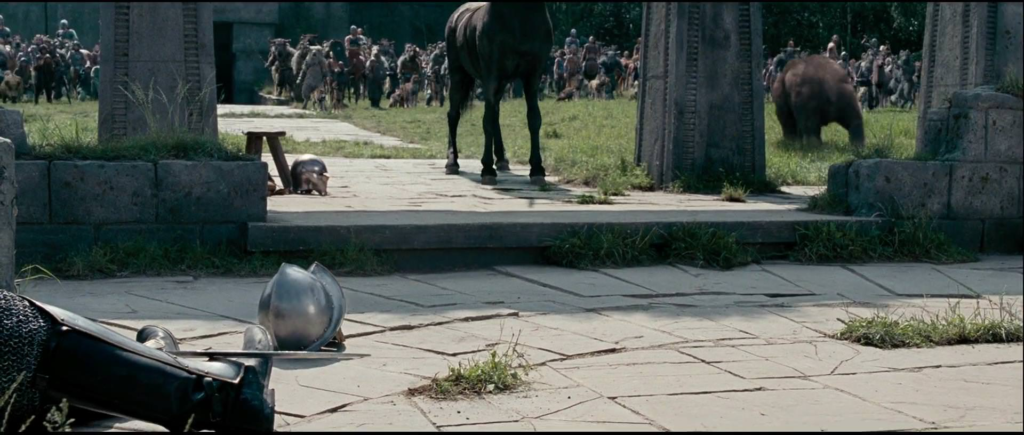
In the book, it’s actually Sopespian whom Peter beheads at that point but since he’s now made himself the main villain, the movie wants to keep alive a tad longer. Not that I’m complaining. Damian Alcazar earns it. Glozelle rallies the Telmarine cavalry[10]I appreciate that the movie keeps the line, “To arms, Telmar!” and the catapults start heaving boulders at the How. Caspian and Glenstorm rush inside it to rally the Narnians within while Susan commands the archers. I’ll be honest. I’m really not a fan of the battle scene that ensues. Of course, I’m not interested in epic battle scenes in general and you’ll remember I resented the one at the end of The Lion, the Witch and the Wardrobe (2005) for taking time away from what I consider some of the book’s most memorable material. But I still felt that scene worked on its own terms. This battle just drags on and on and on and I keep wondering what Lucy is doing. The pacing on this part is so off! First, they cut to Lucy when I was all set to focus on Peter and now, they stay with him and his army when I want to go back to her. I’ll try to get through describing the scene as quickly as possible without leaving out any highlights.
Caspian leads the Narnians he’s rallied racing underground, chopping down pillars as they go. This causes the ground beneath the charging Telmarines’ horses to collapse. Only then does Susan order the archers to fire and Peter and Edmund lead their foot soldiers in a charge.
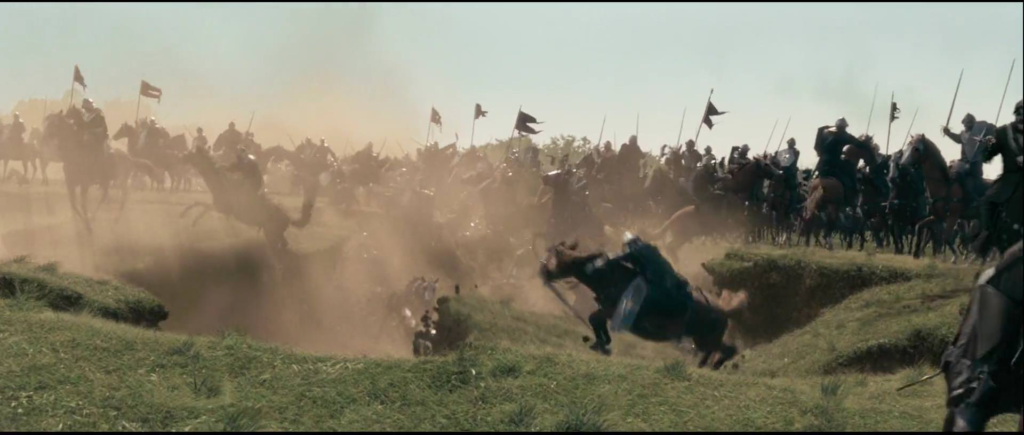
Another part of the ground turns out to be a trapdoor that the Narnians lower, allowing Caspian and his troops to back above ground and surround the enemy.
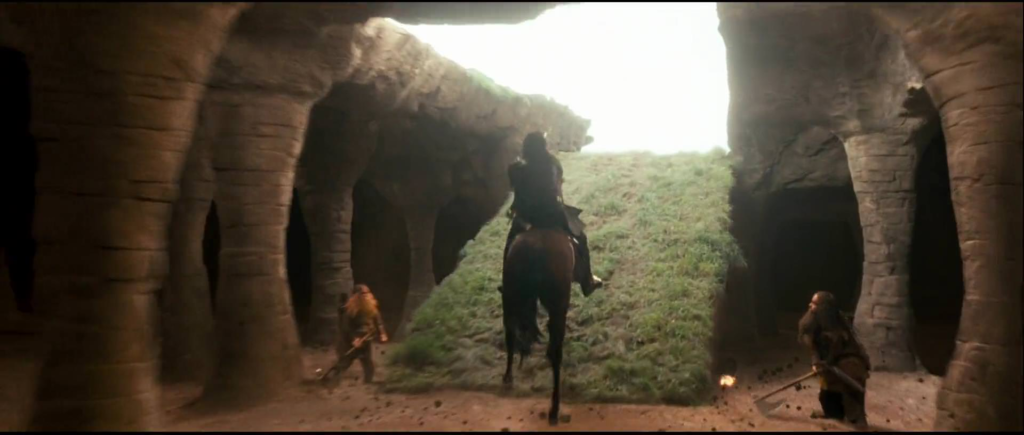
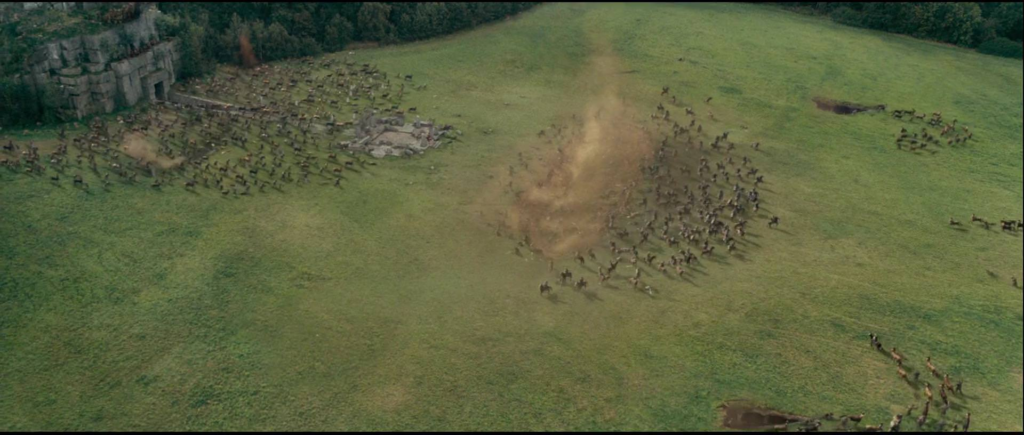
We get to see Wimbleweather hurl an enemy soldier across the field. Since I mentioned that his already minor role in the book is reduced by the movie, I feel like I should also mention it when it gives him something to do.
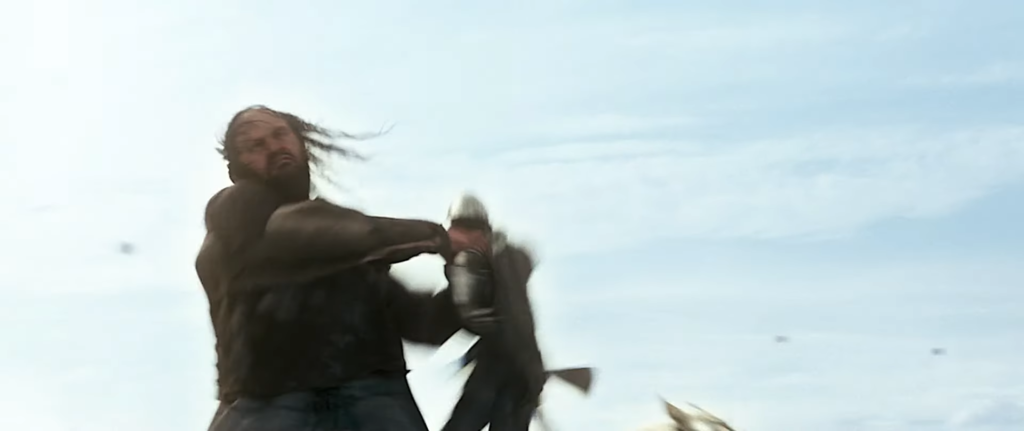
We also see Trufflehunter in battle. (Well, him or another badger.) As one Telmarine (animation supervisor Adam Valdez) crawls out of the pit the Narnians created, he sees Reepicheep standing above him with a sword. “You’re a… mouse?” he says, unable to believe his fate. “You people have no imagination!” Reepicheep cries in exasperation before (it’s implied) finishing him off. I love that line! It’s not something C. S. Lewis’s Reepicheep would have said but it makes me laugh.
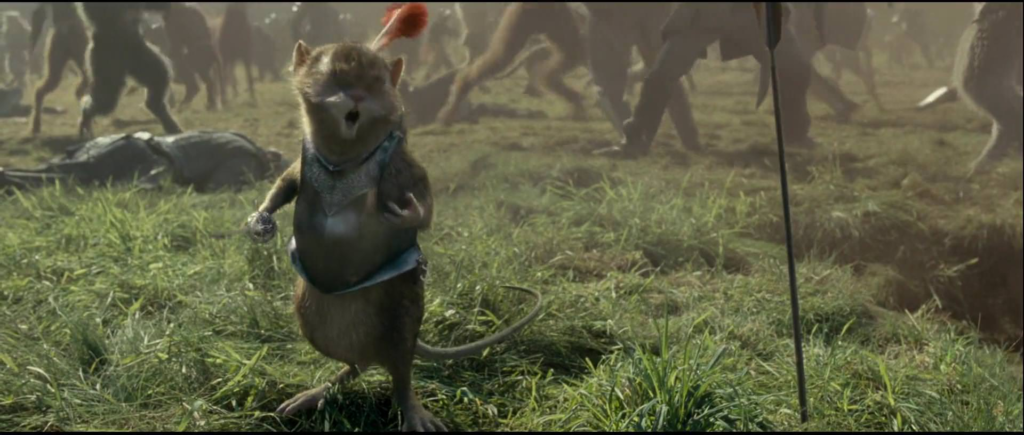
On the other side of the pit, the massive Telmarine army keeps advancing. Gryphons fly Narnian archers over them, but they’re taken down by the Telmarines’ giant war machines. Peter orders the Narnians to retreat into the How. Susan gets what is easily the movie’s cheesiest line. As the walls of Aslan’s How are bombarded by the catapults, she yells, “brace yourselves!” in slow motion to the archers. When are filmmakers going to learn that yelling things in slow motion always sounds dumb? I feel sorry for poor Anna Popplewell whose performance did not deserve that. Anyway, the onslaught accomplishes its purpose of blocking the entrance to the How for the Narnians. “Crush them all!” Sopespian says gleefully. Peter, Caspian, Susan, Edmund and their followers have no choice but to meet the enemy head-on.
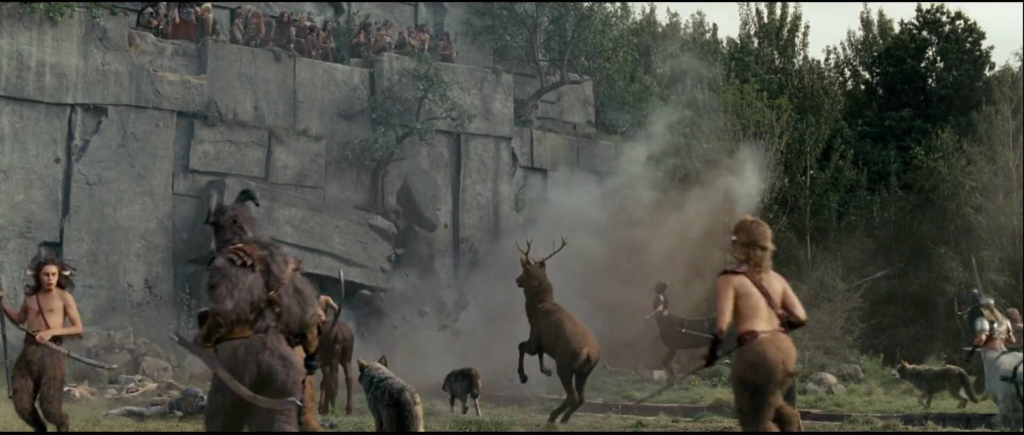
Maybe the reason I’m not as much on the edge of my seat as I should be for this scene is that I’ve read the book, so I already know that nobody about whom I really care is going to die. I suppose that’s inevitable. Then again, in the aforementioned adaptation of Les Misérables, I’m still invested in the characters knowing which ones are going to die.[11]Spoiler: Most of them. Honestly, even if I weren’t familiar with the original book, I don’t think I’d be worried about my favorite characters dying because I’d still be able to tell that this isn’t that kind of movie. Sure, they’re trying to give this one a darker, more dangerous feel than its predecessor. But apart from Nikabrik, who deserved his death, the closest they’ve come to killing off a good guy we know well was Glenstorm’s son and we arguably don’t even know Glenstorm that well. (The dialogue didn’t even specify their relationship. I just picked up on it because I know the book.) Since I’m not really in suspense here, I wish the movie would stop pretending this was suspenseful and move on to stuff that really interests me.
Next Week: Stuff That Really Interests Me!
References
| ↑1 | Actually, it looks like he just steps on his shield but the way Peter roars, it makes more sense for him to have stepped on his hand so that’s what I imagine. |
|---|---|
| ↑2 | There is some violence in the battle after the duel in the book that I’d describe as brutal. |
| ↑3 | In the book, by the way, Peter describes his shoulder as sprained, not dislocated. |
| ↑4 | For what it’s worth, in C. S. Lewis’s Till We Have Faces, which depicts a similar dramatic situation, the antagonistic king says he will disarm the main character, Queen Orual, and then have her hung since “his sword should not be stained with woman’s blood.” Her taunting response is kind of awesome. |
| ↑5 | I am referring to the musical version, not the literary one in which Eponine is a villain albeit an interesting one and very few readers root for her to end up with Marius. |
| ↑6 | You’ll notice that it’s Glozelle who kills Miraz here, not Sopespian. I don’t blame the screenwriters for mixing them up as the book gives them no individual personalities. |
| ↑7 | In the book, they heckle Peter during the duel. Maybe the movie should have kept that. |
| ↑8 | Well, he’s unnamed in the dialogue. According to the credits and presumably the official screenplay, which is sadly unavailable to read online, he’s Lord Gregoire but in these recaps, I usually only use the characters’ names if they’re in the dialogue to replicate the experience of watching the movies. |
| ↑9 | In which Peter also cuts off the man’s legs. I told you there was some brutal violence after the duel in the literary version. |
| ↑10 | I appreciate that the movie keeps the line, “To arms, Telmar!” |
| ↑11 | Spoiler: Most of them. |
